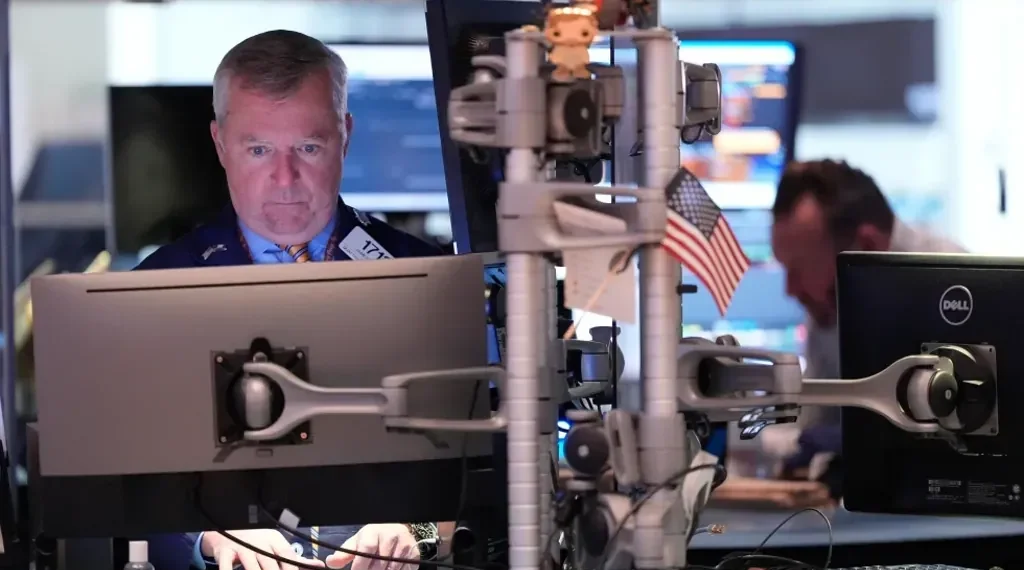Market Rally Pauses as Bitcoin Slumps and Fed Signals Uncertainty
The U.S. stock market declined on Monday as losses in high-flying technology shares, weakening cryptocurrency prices, and shifting expectations for Federal Reserve policy weighed on investor sentiment. Major indexes fell from recent highs, with Wall Street assessing whether the rapid rise in artificial intelligence–focused companies and other momentum-driven sectors has pushed valuations too far.
Nvidia, Bitcoin, and other high-momentum assets saw renewed pressure, contributing to a broader pullback across global markets. The declines came as investors awaited earnings updates, key economic data, and fresh signals from the Federal Reserve about the direction of interest rates.
Nvidia and AI Leaders Lead Market Declines
Shares of Nvidia fell again, extending a volatile stretch that has dominated U.S. markets in recent weeks. The semiconductor company dropped 1.8% and remained the largest drag on major indexes, according to market data widely cited by Reuters and AP News. Other companies tied to the artificial intelligence boom also retreated, including Super Micro Computer, which fell 6.4%.
Nvidia has been at the center of the global AI rally, with its chips powering rapid advances in data centers, machine learning, and cloud computing. The stock remains up 39% this year, even after substantial swings. Over the last five years, Nvidia has doubled in price during four separate years, helping drive both enthusiasm and concerns about valuation levels.
Investors are now looking ahead to Nvidia’s earnings report due Wednesday, which will provide insight into whether the company can continue meeting the extremely high expectations that have fueled its rise. Analysts say sustained profit growth is needed to justify current valuations in the broader AI sector.
Cryptocurrency Retreat Deepens as Bitcoin Falls Below $92,000
Another area of the market under pressure was cryptocurrency-linked assets. Bitcoin dipped below $92,000, down sharply from nearly $125,000 late last month, reflecting broader volatility in digital asset markets.
The decline weighed on companies exposed to cryptocurrency trading and custody. Shares of Coinbase Global fell 7.1%, while Robinhood Markets dropped 5.3%. Both platforms tend to move sharply when crypto prices experience large swings.
Analysts say the downturn in Bitcoin highlights how quickly momentum can reverse in speculative areas of the market, particularly after rapid appreciation earlier in the year.
Broader Market Pullback Follows Months of Rapid Gains
The S&P 500 dropped 0.9% on Monday, extending its decline from an all-time high reached late last month. The Dow Jones Industrial Average fell 557 points, or 1.2%, while the Nasdaq composite slipped 0.8%.
Many analysts have warned in recent months that U.S. stocks appeared vulnerable to a correction following significant gains since April. The strongest concerns have centered on sectors that benefited heavily from enthusiasm around artificial intelligence, cloud computing, and advanced semiconductors.
Despite recent volatility, the market remains up substantially for the year. Still, investors are increasingly weighing whether corporate profits can keep pace with expectations.
Earnings Misses Pressure Non-Tech Stocks
The downbeat sentiment extended beyond technology. Aramark fell 5.2% after the company reported earnings that came in below analyst forecasts. The firm, which provides food and facilities management services to schools, parks, and convention centers, said it expects underlying profits to increase between 20% and 25% in the coming year—strong growth, but short of what analysts had projected.
The disappointment overshadowed gains for Alphabet, which rose 3.1% after Berkshire Hathaway disclosed a $4.34 billion stake in Google’s parent company. Warren Buffett’s firm is known for investing in companies it views as undervalued, and its purchase signaled confidence in Alphabet despite elevated valuations across the technology sector.
U.S. Federal Reserve Policy Outlook Remains Uncertain
Another factor influencing markets is uncertainty over Federal Reserve interest-rate policy. Investors had largely expected the Fed to continue cutting rates to support the cooling job market. Lower rates tend to boost both economic activity and asset prices by reducing borrowing costs.
However, uneven economic data and persistent inflation above the Fed’s 2% target have raised doubts about whether the central bank will proceed with another rate cut at its December meeting. Some Fed officials have signaled a preference for waiting, citing the importance of fresh labor-market data following the government shutdown that delayed key economic releases.
Analysts say the market may remain volatile as investors reassess how much rate support to expect heading into 2026.
Stifel chief equity strategist Barry Bannister said the Fed is likely to cut rates only in response to a slowing economy over the next two years, rather than providing pre-emptive easing. He argued that the “Fed’s ‘free lunch’ is over,” suggesting a less supportive environment for stock prices.
On Monday, the yield on the 10-year U.S. Treasury slipped slightly to 4.13% from 4.14% late Friday.
Global Markets Show Mixed Reaction
Market declines were not limited to the United States. European stocks fell modestly, reflecting caution ahead of major U.S. data releases. In Asia, most markets also ended lower.
Tokyo’s Nikkei 225 slipped 0.1% after government data showed Japan’s economy contracted at an annual rate of 1.8% in the July–September quarter, highlighting ongoing challenges for the world’s fourth-largest economy.
South Korea’s Kospi was a rare outperformer, rising 1.9% as demand for tech-related shares lifted the index. The country’s semiconductor and electronics companies benefited from optimism about long-term demand for high-performance computing.
Market Outlook
Investors now look toward Thursday’s release of the delayed U.S. jobs report for September. Economists expect the data to influence the Fed’s December decision and set the tone for markets heading into the final weeks of the year.
Analysts say stronger-than-expected job growth could reduce the likelihood of a rate cut, while weaker results may heighten concerns about the economic outlook.
With AI stocks, cryptocurrency assets, and interest-rate expectations all in flux, global markets appear poised for further volatility as the year winds down.
This article was rewritten by JournosNews.com based on verified reporting from trusted sources. The content has been independently reviewed, fact-checked, and edited for accuracy, neutrality, tone, and global readability in accordance with Google News and AdSense standards.
All opinions, quotes, or statements from contributors, experts, or sourced organizations do not necessarily reflect the views of JournosNews.com. JournosNews.com maintains full editorial independence from any external funders, sponsors, or organizations.
Stay informed with JournosNews.com — your trusted source for verified global reporting and in-depth analysis. Follow us on Google News, BlueSky, and X for real-time updates.














